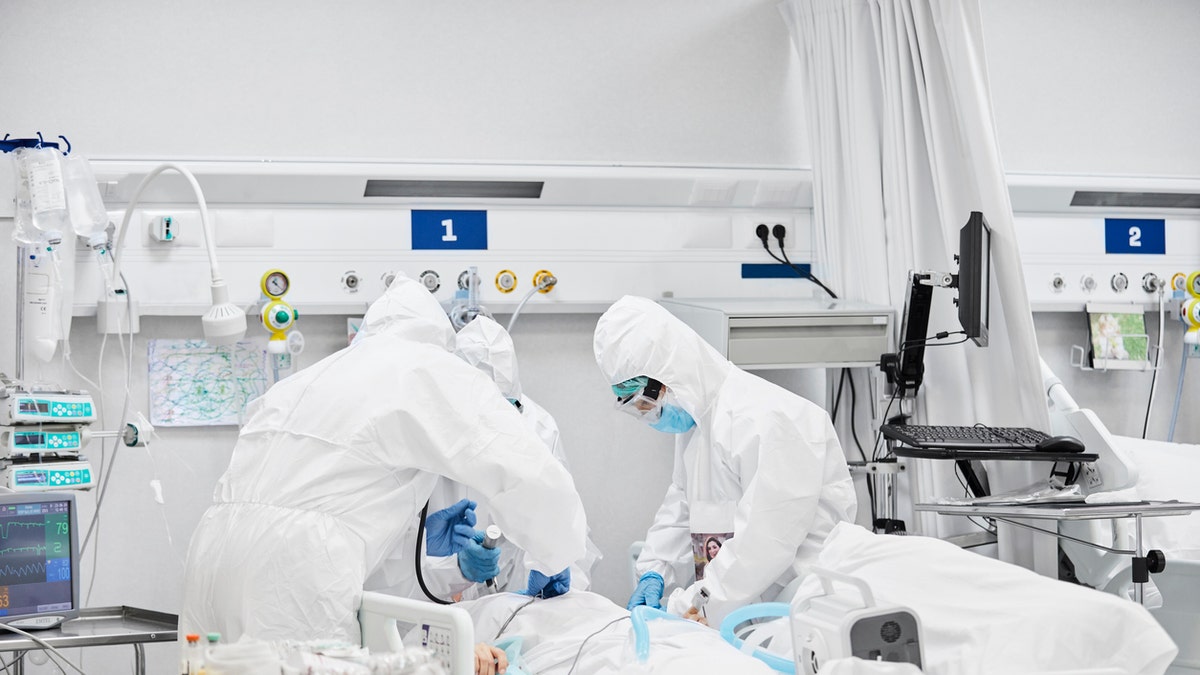Fox News Flash top headlines for January 13
Fox News Flash top headlines are here. Check out what's clicking on Foxnews.com.
A new study found that 40% of about 700 medical workers in the U.K., caring for the most dire coronavirus patients, hit the threshold for developing post-traumatic stress disorder, among other pressing mental health concerns.
This almost certainly hinders the care they can give -- at a time when patients need it the most -- researchers say.
The team from King’s College London published findings Wednesday in the Occupational Medicine journal.
COPING WITH POST-HOLIDAY BLUES AMID CORONAVIRUS: TIPS ON WHAT TO LOOK FOR
The team sent brief, anonymous surveys to intensive care staff in National Health Service hospitals across the U.K. with questions regarding mental health. Nearly half of 709 respondents from nine hospitals met thresholds for either severe depression, anxiety, post-traumatic stress disorder, or issues related to alcohol.
Around one in seven respondents said they’d be better off dead, or frequently considered self-harm.
"Our results show a substantial burden of mental health symptoms being reported by ICU staff towards the end of the first wave in July 2020," Prof. Neil Greenberg, lead author with King’s College London, said in a university release. "The severity of symptoms we identified are highly likely to impair some ICU staff’s ability to provide high-quality care as well as negatively impacting on their quality of life."

Medical staff in intensive care units (ICUs) are responsible for caring for critically ill patients. (iStock)
The study identified nurses in particular as reporting poor mental health, compared to doctors and other ICU health care workers.
Researchers could not pinpoint explanations behind the overall findings, but suggested multiple contributing stressors, like long hours and strains in staffing and resources, compounding existing stresses from caring for children and other responsibilities.
However, the researchers did report a positive finding: "We found no association between poor mental health and alcohol misuse suggesting that within this sample, self-medication with alcohol was not common," reads the study. "Whatever the reason, this finding is heartening."
SERIOUSLY ILL CORONAVIRUS PATIENTS IN UK RECEIVING RHEUMATOID ARTHRITIS DRUGS
The study also suggested the probable PTSD rate among ICU workers amid the early pandemic was nine times greater than the rate among the public, and double that of recent combat veterans.
"The 2014 Adult Psychiatric Morbidity Study found rates of probable PTSD in the UK general public to be [approximately] 4% and other studies have reported an overall PTSD prevalence in UK military personnel of around 7% with the highest rate, of 17%, in veterans who had recently served in a combat role," reads the study. "Thus, probable PTSD rate we report (40%) was around nine times that found within the general population and more than double that found in recent combat veterans."
The study had several limitations, including lacking information on respondents’ demographics, and the potential for response bias, meaning "those who participated may have had especially salient mental health difficulties they wanted to report," per the study.
UK MAY MOVE SOME CORONAVIRUS PATIENTS INTO HOTELS AS HOSPITALS STRUGGLE WITH NEW STRAIN
With this, the lead author, Greenberg, urged prioritizing the mental health of ICU staff.
"Our results highlight the potential profound impact that COVID-19 has had on the mental health of frontline UK staff," Greenberg said, "and indicate an urgent need for a national strategy to protect staff mental health and decrease the risk of functional impairment of ICU staff while they carry out their essential work during COVID-19 and beyond."
According to government data, the number of hospitalized coronavirus patients in the U.K. has surged by 35% over the last week, as of Jan. 7., with another 26,900 people admitted.


